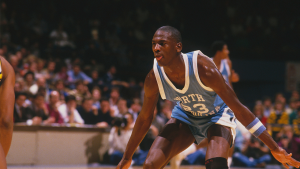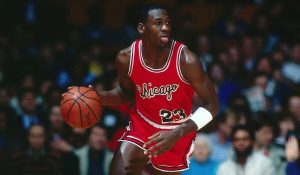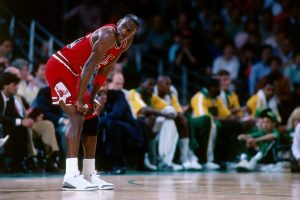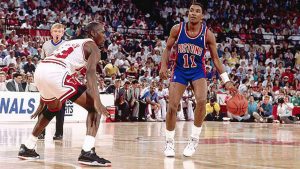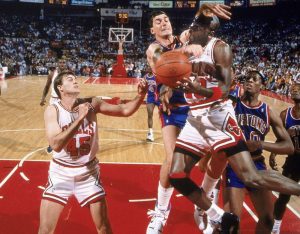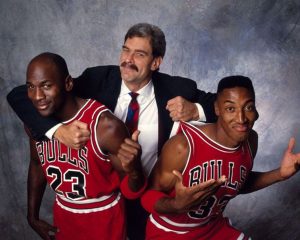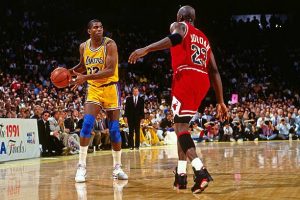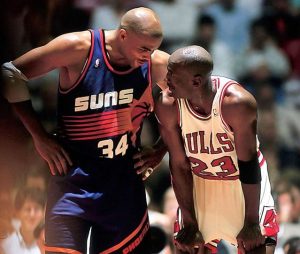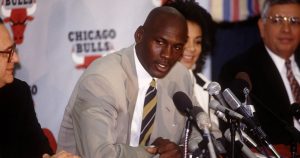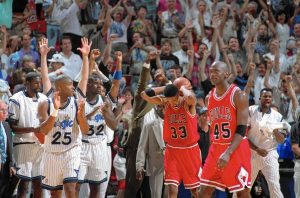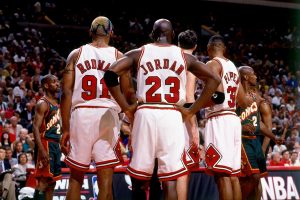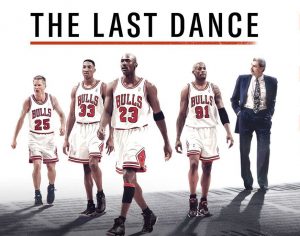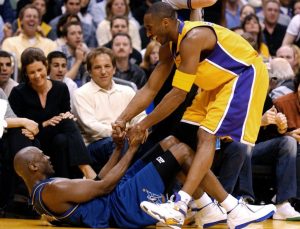What better way to start off the player spotlight series than with the very best to ever touch a basketball, Michael Jordan?
Everyone knows Michael Jordan. Whether you are a casual and only know him for being a Bulls player and 6x NBA championships. Or maybe you’re a sneaker head and only care about the latest release of his sneakers. Hell maybe you just know the name because he is global icon. Regardless, MJ is a house hold name and for a multitude of reasons.
But today I’ll delve deep into his career. All of his iconic moments and accolades. The highs, the lows, and the lasting legacy he leaves behind.
College Days At North Carolina
Despite the idiotic and wrongful outcome of the ESPN fan voting that named Jordan the greatest college basketball player of all, an award only fitting for KareemAbdul-Jabbar, Jordan did have a very good college career.
In his three years as North Carolina under Head Coach Dean Smith, Jordan won the national title in 1982. While standing out enough to eventually be drafted 3rd overall, Jordan and others felt that he wasn’t able to fully excel in Smith’s system.
But Jordan would more than make up for his college limitations when he reached the pros.
1984-85: Rookie Year
Jordan joined the Bulls in 1984 as the third overall draft pick, and quickly emerged as a league star. His prolific scoring caught the attention of fans quickly. His leaping ability, demonstrated by performing slam dunks from the free throw line in the Slam Dunk Contests, earned him the nickname “Air Jordan.”
Jordan won the rookie of the year award as he averaged an absurd 28.2 points, 6.5 rebounds, 5.9 assists and 2.4 steals a game. Those are MVP type numbers put up by a rookie. He also made the all star team in his rookie campaign.
In his first taste of playoff basketball, Jordan and the Bulls faced off against the Milwaukee Bucks, who they lost to in four games. Despite losing the series, Jordan managed to average better numbers than he did in the regular season, with 29 points, 8.5 assists and 2.4 steals per game.
1985-86: Sophomore Campaign
In just the third game if the season, Jordan went down a broken foot that would cause him to miss 64 games. Despite his injury, the Bulls managed to make the playoffs with a god awful 30-52 record. By just getting to the playoffs, the Bulls set the stage for one of Jordan’s most historic nights of his career.
In the round one matchup against the 1985–86 Boston Celtics team that is often considered one of the greatest in NBA history, Jordan set the still-unbroken record for points in a playoff game with 63 in Game 2. Larry Bird dropped one of the most iconic post game comments after the Game 2 explosion by Jordan.
“It’s just God disguised as Michael Jordan.”- Larry Bird after Game 2
However, the Celtics swept the series, sending Jordan home in the first round for the first two years of his career.
1986-87: Most Prolific Scoring Season
Fully recovered from the broken foot that sidelined him for 64 games a season ago, Jordan was ready to scorch earth. Going on an absolute tear every night. Jordan became the only player other than Wilt Chamberlain to score 3,000 points in a season, while on his way to a career high 37.1 points per game on 48% shooting from the field.
But Jordan didn’t only dominate on the offensive end, as he became the first player in NBA history to record 200 steals and 100 blocked shots in a season. Jordan was the best two way player in the league, but it wasn’t enough to capture his first MVP Award as Magic Johnson received the honors.
Jordan and the Bulls once again made the playoffs, but unfortunately got matched up with the Boston Celtics yet again. And once again Larry Bird and the Celtics would sweep the Bulls with Jordan lacking the help he needed.
1987-88: MVP and DPOY
Jordan again led the league in scoring during the 1987–88 season, averaging 35.0 ppg on 53.5% shooting. It was good enough for him to capture his first league MVP Award. Jordan wasn’t done there however. He was also named the Defensive Player of the Year with his 1.6 blocks and a league high 3.16 steals per game. The Bulls finished 50–32, and finally made it out of the first round of the playoffs for the first time in Jordan’s career, as they defeated the Cleveland Cavaliers in five games.
But Jordan would run into another wall this time, and it wasn’t the Boston Celtics. It was the Bad Boy Pistons led by Isiah Thomas. The Bulls would fall to the Pistons in just five games, as Detroit had more experience and team talent.
1988-89: Jordan Rules
In the 1988–89 season, Jordan again led the league in scoring, averaging 32.5 ppg on 53.8% shooting. He added 8 rebounds and 8 assists per game. The Bulls finished with a 47–35 record, and advanced to the Eastern Conference Finals, defeating the Cavaliers and New York Knicks along the way. The Cavaliers series included a career highlight for Jordan when he hit “The Shot” over Craig Ehlo at the buzzer in the fifth and final game of the series.
However, the Pistons again defeated the Bulls, this time in six games. By utilizing their “Jordan Rules” method of guarding Jordan, they made it difficult for Jordan to dominate. This consisted of double and triple teaming Jordan every time he touched the ball, making ever so obvious MJ needed another reliable elite player to run with.
1989-90: On the Rise
The Bulls entered the 1989–90 season as a team on the rise. Under the guidance of new head coach Phil Jackson, young players like Scottie Pippen and Horace Grant improved immensely. As they joined Jordan as a definite part of a reliable core, the Bulls future was bright.
A stand out game by Jordan this season was on March 28, 1990, where Jordan scored a career-high 69 points on the road in Cleveland. His 69 point outburst helped him once again lead the league in scoring, this time with 33.6 ppg.
After advancing to the conference finals for the second consecutive season, the Bulls ran into the Bad Boy Pistons yet again. This time around the series was much more competitive as the Bulls pushed the Pistons to their limit in a 7 game series. However the outcome as the same as the Bulls were eliminated by the Pistons for the third consecutive year.
1990-91: A year of Firsts
In the 1990–91 season, the Bulls set a franchise record with 61 wins in the regular season. Jordan won his second MVP award after averaging 31.5 ppg on 53.9% shooting, 6.0 rpg, and 5.5 apg for the regular season. But he wasn’t the only stand out performer for the Bulls. Scottie Pippen built upon the previous season, upping his points, rebounds and assists per game.
After defeating the Knicks and 76ers in the first two rounds of the playoffs, the Bulls would face off with their rival Pistons for the 4th straight year in the playoffs. This time the outcome would be different as the Bulls sweep the Pistons in embarrassing fashion. You may remember the Pistons leaving the court before the buzzer to avoid shaking hands with the Bulls.
The Bulls advanced to the NBA Finals for the first time in franchise history to face the Los Angeles Lakers, who had Magic Johnson and James Worthy. This was far from the showtime Lakers of the 80’s, but they were still a formidable competitor. The Bulls won the series four games to one, and compiled a 15–2 playoff record along the way.
The highlight moment of the series came in Game 2 when, attempting a dunk, Jordan avoided a potential Sam Perkins block by switching the ball from his right hand to his left in mid-air to make the layup.
In his first finals appearance, Jordan won his first Finals MVP Award, averaging 31.2 points on 56% shooting from the field, with 11.4 assists, 6.6 rebounds, 2.8 steals, and 1.4 blocks.
1991-92: Back to Back
The previous season was just the beginning of Jordan’s reign. Continuing their dominance, the Bulls had a 67–15 record, topping their franchise record from 1990–91. Jordan won his second consecutive MVP award with averages of 30.1 points, 6.4 rebounds and 6.1 assists per game on 52% shooting.
The playoffs were physical, especially the 7-game series win over the New York Knicks in the second round. The Bulls would go on to beat the Cavs in the conference finals, setting up the stage for another iconic Jordan moment in the NBA Finals.
In the finals matchup against Clyde Drexler and the Trailblazers, the media was setting the stage, hoping to recreate the Magic-Bird hype. It never reached that level for a number of reasons, and Jordan made sure of it by dominating the series.
Most memorable moment from the series is Jordan’s game 1 performance where he drained six three pointers on his way to 35 first half points. The birth of the “Jordan shrug” took placer this game, and is always apart of Jordan’s highlight reels.
The Bulls went on to win Game 1, and defeat the Blazers in six games. Jordan was named Finals MVP for the second year in a row and finished the series averaging 35.8 ppg, 4.8 rpg, and 6.5 apg, while shooting 53% from the floor.
1992-93: 1st 3-Peat
Despite season averages of 32.6 ppg, 6.7 rpg, and 5.5 apg and a second-place finish in Defensive Player of the Year voting, Jordan’s streak of consecutive MVP seasons ended as Charles Barkley would take home the award. Ironically, Jordan and Barkley would go head to head in the NBA finals this season.
In closing out the Suns in 6 games, Jordan went on an absolute tear. He averaged a Finals-record 41.0 ppg and became the first player in NBA history to win three straight Finals MVP awards. He scored more than 30 points in every game of the series, including 40 or more points in 4 consecutive games. Was this tear simply for the championship, or was there extra effort in letting the voters know he should have been the MVP?
Capping off a seven year run where he won seven scoring titles and three championships, Jordan was the at the pinnacle of the sports world. But pressures of fame, the death of his father, and personal issues caught up with Jordan.
1993-94: 1st Retirement and Baseball???
On October 6, 1993, Jordan announced his retirement, citing a loss of desire to play the game. Jordan later stated that the death of his father three months earlier also shaped his decision.
Jordan is also on record saying that he contemplated retirement as early as after the 1992 finals. He said that the exhaustion from the Dream Team run in the 1992 Olympics solidified Jordan’s feelings about the game. He lost the love for the game as his star celebrity status grew.
The move shocked the sports world, leading the front page of newspapers across the globe. But his next career choice was just as shocking.
Jordan signed a Minor League Baseball contract with the Chicago White Sox on February 7, 1994. After spending the spring with the big league club, he was assigned to the team’s minor league system. Jordan stated the desire to play baseball was to live out his late father’s dream of Jordan playing baseball.
In 1994, Jordan played for the Birmingham Barons, a Double-A minor league affiliate of the Chicago White Sox. He batted .202 with three home runs. Jordan showed his athleticism with30 stolen bases. He would actually play much better in the Arizona Fall league where he faced top prospects, with a .252 batting average.
But the true love of Jordan would come calling again. On November 1, 1994, his number 23 was retired by the Bulls in a ceremony that included the permanent sculpture known as “The Spirit” outside the new United Center. I believe it was being back on a court that reminded Jordan that basketball was his calling.
1995: “I’m Back”
Despite Jordan’s absence in the 1993-94 season, the Chicago Bulls went 55–27, before eventually losing to the New York Knicks in the second round of the playoffs.
The 1994–95 Bulls were a shell of the championship team of just two years earlier. Chicago was 31–31 at one point in mid-March and in dire need of help. Luckily help was on the way.
On March 18th, 1995, with these two simple words “I’m back,” Jordan announced his return to the NBA, once again shaking the sports world. The very next night Jordan laced up and dropped 19 points on a good Indiana Pacers team. Not bad for a minor league baseball player right?
His first game back had the highest rating of a regular season NBA game since 1975. Despite being allowed to wear his retied number 23 jersey Jordan elected to wear number 45, his baseball number.
Just his 4th game back after a year and a half hiatus, Jordan made a game-winning jump shot against Atlanta in his fourth game back. The very next night he dropped his “double nickel” game, scoring 55 on the Knicks in Madison Square Garden.
Jordan’s comeback boosted the Bulls. They went 13-4 down the stretch, and ended up in the semifinals against the young Shaq and Penny led Orlando Magic.
At the end of Game 1, Orlando’s Nick Anderson stripped Jordan from behind, leading to the game-winning basket for the Magic.
Anderson he would later comment on Jordan.
“didn’t look like the old Michael Jordan” Anderson said “No. 45 doesn’t explode like No. 23 used to.”
Jordan naturally responded by switching back to his 23 jersey the next game and dropping 38 points in a Chicago win.
But the Bulls celebration would be temporary as the Magic went on to win the series in 6 games.
1995-96: 72-10
Coming off the early exit and loss to the young Magic team, Jordan was determined to once again sit at the throne. Their determination and off season workouts definitely paid off as the Bulls started the season 41-3. The addition of once rival Dennis Rodman helped bolster the already impressive roster. He provided mind games and intimidation, allowing Jordan and Pippen to focus on just the game.
Jordan was back to his old self, leading the league with 30.4 ppg and winning league MVP and all-star MVP. The Bulls finished the season with a then NBA record 72 wins.
The Bulls dominance contend in the playoffs, only losing 3 games in 4 series. They swept Miami, beat the Knicks in 5, and swept Orlando. The defeated the Seattle Super Sonics in just 6 games, winning their 4th NBA title of the decade. Jordan won his 4th Finals MVP, passing Magic Johnson for the most ever.
The most memorable photo form this season was Jordan laid out on the locker room floor in tears holding the trophy. The emotions of winning his firs title since his father’s death, on Father’s Day was too much to keep in.
1996-97: Back to Back Again..
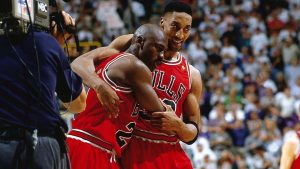
The 96-97 Bulls get overlooked. They started out the season 69-11, with the chance to win 70 games for two consecutive seasons. They missed out, losing the final two games. But the dominance shouldn’t be overlooked. They once again ran through the East and found themselves back in the NBA Finals.
They would be opposite the reigning MVP Karl Malone and the Utah Jazz. This series is apart of Jordan’s legacy as a clutch player. The Game 1 game winner by Jordan helped get the Bulls ahead in the series. Then we have everyone’s favorite story, the “Flu Game” in Game 5.
In the flu game, Jordan scored 38 points, including the game-deciding 3-pointer with 25 seconds remaining. This broke the series 2-2 tie, setting up a close out game 6. The Bulls did just that, closing out the Jazz and winning their 5th title in 5 attempts.
1997-98: The Last Dance
Chicago won 62 games in the 97-98 season, as Jordan led the league with 28.7 points per game. He secured his fifth regular-season MVP award. He also received honors for All-NBA First Team, First Defensive Team and the All-Star Game MVP.
The Bulls won the Eastern Conference Championship for a third straight season, but it wasn’t easy. They had to survive a seven-game series with the Indiana Pacers in the Eastern Conference Finals.
For the second consecutive year the Bulls met the Jazz in the NBA Finals. It was yet another iconic series, and the last time we would see Jordan in a Bulls jersey. Leading the series 3–2. Jordan executed a series of plays, considered to be one of the greatest clutch performances in NBA Finals history.
Trailing the Jazz 86–83 with 41.9 seconds remaining, Phil Jackson called a timeout. When play resumed, Jordan received the inbound pass, drove to the basket, and scored. That cut the Utah lead to 86–85. The Jazz brought the ball up court and passed the ball to forward Karl Malone in the post. Jordan cut behind him and took the ball out of his hands for a steal. The steal set up the mist iconic image to exists of Jordan.
With 10 seconds remaining, Jordan started to dribble right, then crossed over to his left, possibly pushing off Byron Russell, although the officials did not call a foul. With 5.2 seconds left, Jordan made the climactic shot of his Bulls career. Chicago took an 87–86 lead with his jumper over Russell, ultimately winning the series.
Jordan was named Finals MVP for the 6th time, capping off his Bulls career.
1998-2001: 2nd Retirement
With Phil Jackson’s contract expiring, and Pippen and Rodman departures, the Bulls dynasty was over. Jordan retired for the second time on January 13, 1999. We were sure the legend was done for good with the basketball world. Except he wasn’t.
On January 19, 2000, Jordan returned to the NBA not as a player, but as part owner and president of basketball operations for the Washington Wizards. Jordan controlled all aspects of the Wizards’ basketball operations, and had the final say in all personnel matters. He famously took Kwame Brown with the number one pick in the draft. Safe to say this wasn’t Jordan’s strongest skillset. Just ask Stephen A Smith about Kwame Brown.
When Jordan retied he said he was “99.9%” sure he would never play in the NBA again. Well that 0.01% prevailed as Jordan announced his return to the NBA to play for the Washington Wizards.
2001-03: Comeback with the Washington Wizards
On September 25, 2001, Jordan announced his return to the NBA to play for the Washington Wizards, indicating his intention to donate his salary as a player to a relief effort for the victims of the September 11 attacks. The 2001-02 season was an injury plagued season for Jordan, only playing in 60 games. Jordan showed that he was still capable of playing at the NBA level. He led the Wizards in scoring (22.9 ppg), assists (5.2 apg), and steals (1.42 spg).
In 2003, Jordan once again withstood the test of time. By playing in all 82 games, Jordan was the only Wizards player to do so. The highlight of the season was the 2003 NBA All-Star Game. Fans and players paid their respect to the legend. In the game he passed Kareem Abdul-Jabbar for most all star game points (Kobe since broke it).
Speaking of Kobe Bryant, he gave Jordan his own personal farewell. On March 28, 2003, a Friday night in Los Angeles, Bryant put on a show against Jordan. Kobe scored 55 points, just dominating the Wizards. Jordan scored a team high 23 that night, but Kobe was just on a different level than the 40 year old.
His final NBA game on April 16, 2003, in Philadelphia. It wasn’t the farewell Kobe gave us dropping 60, but Jordan’s final game gave us some memorable moments.
At 1:45, Jordan was intentionally fouled by the 76ers’ Eric Snow, and stepped to the line to make both free throws. After sinking the second free throw, Jordan was taken out of the game to a 3 minute standing ovation. 21,257 fans, players, coaches officials and commentators all gave Jordan his final farewell.
Jordan’s Lasting Legacy
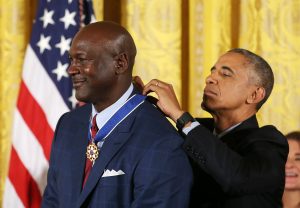
Almost universally accepted as the G.O.A.T, Jordan’s legacy supersedes that conversation. Jordan is the current owner of the Charlotte Hornets, and has stayed around the game. His impact on the growth of the league globally can not be overlooked. The sneaker game owes Jordan a lifetime of thanks for what he has done for the culture. Even for a generation of players, Jordan was their hero. When a special talent enters the league, they get tagged with possibly being the next Jordan.
The lasting legacy of Jordan will far succeed his time on this earth. He will forever live through passing down of stories and the history books.
In case you missed it
What if Kevin Garnett got traded to the Lakers, not the Celtics?
